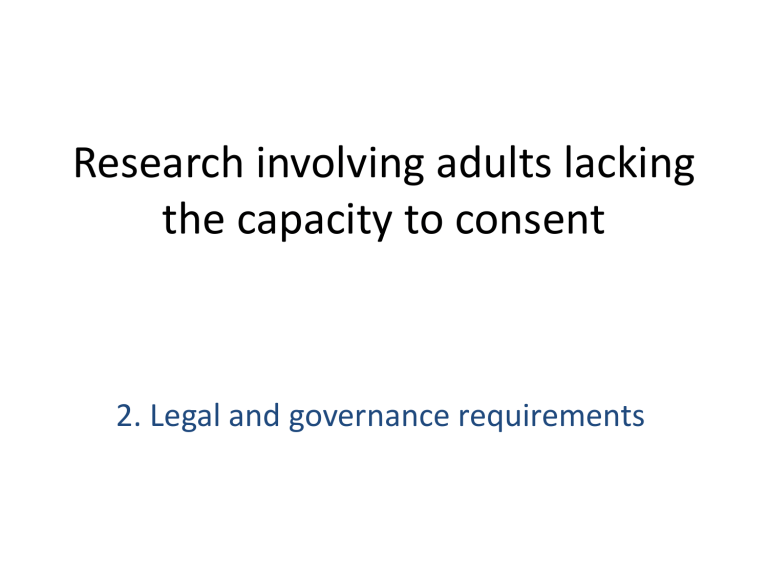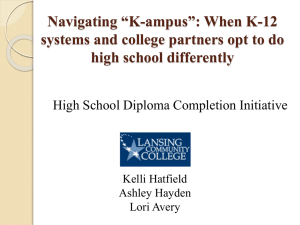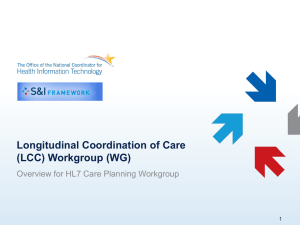Research involving adults lacking the capacity to consent Legal

Research involving adults lacking the capacity to consent
2. Legal and governance requirements
Governance routes
CTIMP or not CTIMP?
• The Medicines and Healthcare Products Regulatory Agency’s
(MHRA) Algorithm can assist in determining whether your research involves a CTIMP or not:
• http://www.mhra.gov.uk/Howweregulate/Medicines/Licensingofmedicines/Clinica ltrials/Isaclinicaltrialauthorisationrequired/CON014022
• The algorithm distinguishes research into medicinal products from non-medicinal products (e.g. blood, cells, tissues, food products not presented as a medicine, cosmetic products, medical devices)
• It also takes into account the nature and scope of the effects being looked for in the research
• Most research will be non-CTIMP research
Non-CTIMP requirements
1. Clarifying the framework
• The Mental Capacity Act 2005. Research provisions in s.30-34 were introduced from October 2007
• Applies in England and Wales only
• Research taking place in Scotland is regulated by s.51 of the Adults with Incapacity (Scotland) Act 2000
• Research in Northern Ireland is governed by the common law
• Research spanning sites across the UK and other countries must adhere to local requirements, and will often require numerous approvals from RECs
Non-CTIMP requirements
1. Clarifying the framework (cont.)
The MCA is built upon 5 core principles (s.1):
1. A person must be assumed to have capacity unless established otherwise
2. Individuals should be helped to make their own decisions as far as practicable
3. A person is not to be treated as unable to make a decision merely because he makes an unwise decision
4. Decisions and actions must be in the best interests of the person lacking capacity
5. All decisions and actions must be the least restrictive of the person’s rights and freedom of action
In terms of the MCA’s research provisions, principles 4 and 5 are modified and extended to offer adults LCC greater protections
Non-CTIMP requirements
2. Clarifying research
• The MCA applies to all ‘intrusive research’: any research that would otherwise require consent to be lawful
• Research projects seeking to involve adults LCC will extend across social contexts
• If the study is designed solely for the purposes of service evaluation and development it is defined as ‘audit’, and falls outside the remit of the MCA
• Note: In social care, a broader definition of research is preferred.
Service audits are classed as research, and can be reviewed by a REC
Non-CTIMP requirements
3. Clarifying relevant participants
• The MCA applies to adults (16 and over) lacking the capacity to consent
• Research involving minors is governed by the common law. See: http://www.mrc.ac.uk/Utilities/Documentrecord/index.htm?d=MRC002430
• What does it mean to lack capacity to consent?
• The MCA’s two-stage test (s.2 and s.3):
1. Is there an impairment of, or disturbance in, the functioning of mind or brain? And, if so...
2. Is the impairment or disturbance such that the person is unable to make the specific decision to take part in a research project
Non-CTIMP requirements
3. Clarifying relevant participants (cont.)
Under the MCA, an adult is unable to make a decision, if he is unable to: a) Understand the information relevant to the decision , b) Retain that information, c) Use, and weigh up, the information in the process of coming to a decision, or d) Communicate his decision (by any means)
• Adults LCC will include those with dementia, those who have significant learning disabilities, or those with physical conditions causing confusion or loss of consciousness
Non-CTIMP requirements
3. Clarifying relevant participants (cont.)
• Capacity cannot be presumed in any person. However, sometimes a lack of capacity will be clear (e.g. in a patient in a coma)
• In other cases:
– Capacity will be temporary (e.g. in a person who has had an accident)
– Capacity will be borderline (e.g. in a person with a moderate intellectual impairment)
– Capacity will fluctuate (e.g. in a person with a drug dependency)
– Capacity will be an anticipated future issue (e.g. in longitudinal research involving people with dementia)
• In all cases, every attempt must be made to enable adults LCC to participate with consent
Non-CTIMP requirements
4. What does the MCA require?
• Approval to involve adults LCC in research is granted under section 30 of the MCA: ‘Section 30 approval'
• To obtain Section 30 approval, the REC requires researchers to fulfil a number of requirements under three supplementary sections of the MCA:
– Section 31: general requirements
– Section 32: consultation requirements
– Section 33: supplementary requirements
Non-CTIMP requirements
5. General requirements under Section 31
a) The research must be connected to the impairing condition that means an adult lacks the capacity to give consent, or to the care/treatment of that condition b) There must be reasonable grounds for believing that research of comparable effectiveness could not be carried out if the project is confined to adults with capacity. (Designed to prevent ‘convenience sampling’) c) The research must have the potential to: a) benefit participants without imposing a disproportionate burden, OR b) benefit others with the same/similar impairing condition, IF the risk to the participant is negligible, AND the research will not be unduly invasive or interfere significantly with participants’ freedom of action or privacy
Non-CTIMP requirements
6. Consultation requirements under Section 32
• First, the researcher must identify a ‘personal consultee’ (PC) who is
– not connected with the research project, and
– i) engaged in caring for the participant, ii) interested in his welfare (but not in a professional capacity or for remuneration), iii) has been previously named by the adult LCC, or iv) has been appointed by a Lasting Power of Attorney, and
– is willing to be consulted
• The researcher must then:
– provide the PC with information about the project
– ensure that the PC can give advice about what the adult LCC’s wishes, feelings and values would be in relation to being involved in the project
• If the PC believes that the person’s previous wishes and values would suggest he participates, the PC should advise that the research can proceed
Non-CTIMP requirements
6. Consultation requirements under Section 32 (cont.)
• Second, for situations in which a PC cannot be identified, or the identified
PC is unwilling to fulfil the role, a ‘nominated consultee’ (NC) should be identified
• The NC must be:
– a person who cares for the proposed participant, or is interested in his/her welfare, in a professional or paid capacity (e.g. the participant’s key worker in a care home or a GP), and
– unconnected to the research
• The NC is expected to fulfil the same role as the PC
• Note: Under the MCA, no person can give consent/assent on behalf of an adult LCC in relation to any decision
Non-CTIMP requirements
7. Supplementary requirements under Section 33
• Nothing can be done in the research that the adult LCC appears to object to
• The adult LCC must be withdrawn immediately from the research if the PC/NC indicates that the person should be withdrawn
• The person’s interests must be assumed to outweigh those of science and society
• Any ‘advanced decision’ or ‘advanced statement’ made by the adult LCC, prior to losing capacity, in relation to participation in research must be taken into account
• Check (or ask someone to check) the person’s notes
• Ask the PC or NC if they are aware of any statement having been made
• If the advanced decision is to not to participate in a research project, it must be followed. Is the decision valid, and applicable to this study?
• If the advanced statement expresses an interest in participating in research, it should be weighed up alongside the consultee’s advice
Managing special situations under the MCA
A. When a participant loses capacity during the research study
• Researchers no longer have valid consent if participants lose capacity (s.30)
• Researchers can continue to involve the participant (should they so desire) if they have received Section 30 approval from a REC
• Therefore, procedures must be in place to involve adults LCC, and these procedures must be in line with sections 31-33 of the MCA
Managing special situations under the MCA
B. When research takes place in ‘emergency’ situations
• Some research might take place alongside the provision of emergency treatment, where it will be impractical to identify and seek advice from a consultee beforehand
• Consider research in: A&E Departments, paramedic services
• Section 32(9) allows the research to include the adult LCC with the agreement of an independent doctor, or in accordance with a procedure agreed by an REC
• The advice of a consultee on whether the adult LCC should continue as a participant in the study must be sought as soon as possible after the emergency treatment is provided
Non-CTIMP approval through NRES
• Non-CTIMP research involving adults LCC must be approved by an NRES
REC:
– A ‘flagged’ NHS REC
– The Social Care REC
• A REC will require researchers to be able to demonstrate that reasonable arrangements are in place to meet the requirements under s.31, s.32 and s.33. For example, do researchers have:
– The relevant skills and experience to assess capacity, or procedures in place to ensure that those with the relevant skills and experience will assess capacity?
– Good reasons for including adults lacking capacity in their research?
– A clear plan in their protocol for approaching, providing information to, and seeking advice from, PCs and NCs for individual participants?
• These requirements are incorporated into a number of questions in Part B of the IRAS form
Moving onto CTIMP research
CTIMP Research
• CTIMPs are regulated by the Medicines for Human Use (Clinical Trials)
Regulations 2004
• The regulations are derived from European Directive 2001/20/EC, which outlines how clinical trials in the EU should be conducted
• The regulations apply to CTIMPs undertaken across the UK
• Schedule 1, Part 5 of the regulations outlines the special requirements for
CTIMPs involving adults LCC to proceed
• These requirements place a higher threshold for authorisation than the comparable requirements in the Mental Capacity Act
CTIMP requirements
4 principles
1. The ‘legal representative’ (LR) of an adult LCC must give written consent that the
CTIMP can proceed. This consent legally represents the adult’s ‘presumed will’
– Note inconsistency with the MCA and English common law relating to consent
–
–
A ‘Personal LR’ is suitable by virtue of their relationship to the adult LCC
If no such person is available or willing to act, a ‘Nominated LR’ is approached. This is the doctor primarily responsible for the treatment of the adult LCC
2. The trial must have been designed to minimise pain, discomfort, fear and any risk relating to the disease and cognitive abilities of the adult LCC
3. The risk threshold and the degree of distress have to be specially defined and constantly monitored
4. The interests of the adult LCC always prevail over those of science and society
CTIMP requirements
For Principle 1 to be upheld, the following conditions must be met...
1.
The researcher has had an interview with the LR, outlining objectives, risks and inconveniences of the trial
2.
A contact point has been provided to the LR
3.
The LR is informed about the right to withdraw the adult LCC at any time. The
LR has a role in continually reviewing participation
4.
The adult LCC has received information, regardless of the fact that he might lack the ability to understand this information
5.
The explicit wish of an adult LCC who is capable of forming an opinion and assessing the information to refuse participation, or withdraw from the trial, is considered at any time. Dissent is legally relevant.
6.
No incentives of financial payments are given to the adult LCC, or to the LR.
Compensation for expenses incurred can be reimbursed
CTIMP requirements
For Principles 2-4 to be upheld, the following conditions must be met...
1.
There are grounds for expecting that administering the medicinal product will produce a benefit for the adult LCC that outweigh the risks – or that being a participant in the trial will produce no risk at all
2.
The trial relates directly to a life-threatening or debilitating clinical condition from which the adult LCC suffers a) The CTIMP must have potential direct benefit to the adult LCC who is participating. Potential benefits for future patients do not justify inclusion
3.
The trial is essential to validate data obtained a) in other clinical trials involving participants able to give consent, or b) by other research methods
Managing special situations for CTIMPs
A. When a participant loses capacity during the course of a CTIMP
• In contrast to the requirements of the MCA for non-CTIMP research, the original consent extends to situations when the adult loses capacity
• Consent from a LR would only be required when a substantial amendment was made to the clinical trial design, such that fresh consent from participants would be require
• It would be important to take into account the expresses wishes of the participant who has lost capacity
Managing special situations for CTIMPs
B. When a CTIMP takes place in ‘emergency’ situations
• The Medicines for Human Use (Clinical Trials) Amendment No.2 Regulations 2006 apply
• Prior to this amendment, no research could go ahead in emergency medicine without fulfilling the requirements of the 2004 regulations
• This amendment applies when the clinical trial relates to urgent treatment, and when it is not reasonably practicable to seek consent from a LR
• The research can go ahead in emergency situations if the research takes place in accordance with the procedures approved by a REC
• Consent from the adult LCC (if able to give consent), or from the LR, must be sought as soon as is practicable following the emergency treatment
CTIMP approval through NRES
• CTIMPs involving adults LCC must be approved by an NHS REC that is:
– Recognised to review CTIMPs
– Flagged to review studies involving adults LCC
• RECs reviewing CTIMPs involving adults LCC must also seek ‘expert advice’
– Have a member with professional expertise in the disease and population group to which the trial relates
– Co-opt a member from another REC
– Get advice from an expert referee
Some practical considerations
1. The emphasis on protection
• Both the MCA and Clinical Trials Regulations treat research involving adults LCC as a ‘special case’
• The general position is that adults LCC should be excluded from participating in research, whenever possible
• Researchers need to give careful thought to justifying why their research should be permitted to proceed if it involves adults LCC, and to provide a considered and detailed defence of their study
Some practical considerations
2. Time and effort
• Involving adults LCC is time consuming and requires much more work on the behalf of the researchers
• The ethics review process, capacity assessment, recruitment, and consultation procedures can take months to fulfil, and can be extremely frustrating
• Extra information sheets and consultee declaration forms are required
• The feasibility of including adults LCC in student projects or dissertations
(particularly at undergraduate or Masters level) needs to be given careful thought
Some practical considerations
3. Inconsistencies in the REC system
• Members of MCA or CTIMP ‘flagged’ committees will have received specific training on the legal requirements
• However, recent research has analysed RECs’ decision letters and drawn attention to inconsistencies in the knowledge and interpretation of the
MCA’s requirements
• Researchers need to consider the appropriateness of an appeal if they feel that they have designed a protocol that is consistent with the legal and governance procedures relating to adults LCC, but has been given an unfavourable opinion on these grounds
Any specific questions on the legal and governance requirements?
Exploring the challenges in specific research studies
• Difficulties can arise when attempting to apply the legal and governance requirements in the protocols designed for specific studies
• These challenges can arise in relation to justifying inclusion, assessing capacity and fulfilling consultation requirements
• The rest of today’s workshop will examine the nature of some of these challenges
• We will split into groups, and interrogate a number of project plans
1. A survey research case study
2. A qualitative interview research case study
3. A CTIMP case study
4. Practical challenges in consultation: The distant cousin
• We’ll then seek answers to specific issues arising in your own research







